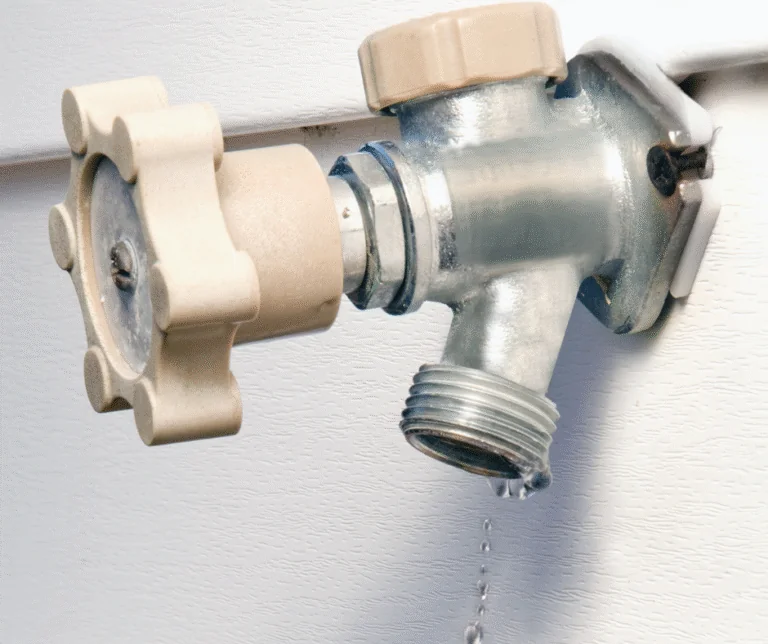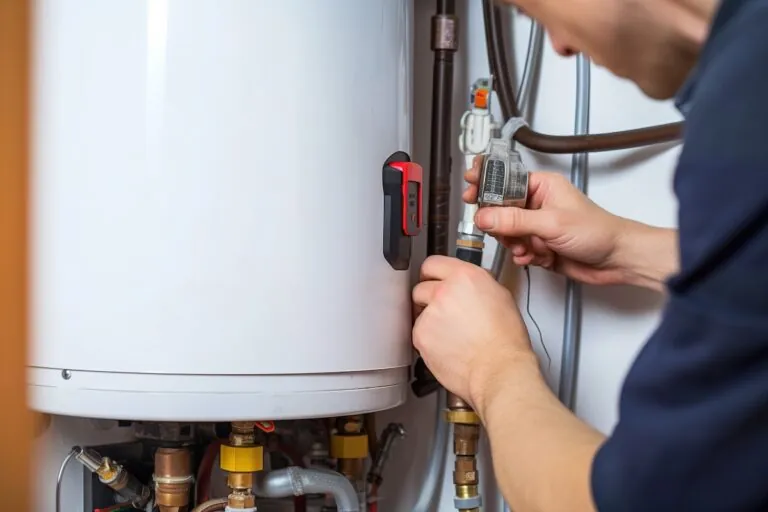If you’re wondering how long your water heater will last—or if it’s time to replace it—you’re not alone. Water heaters play a crucial role in your home, and knowing when to repair or replace them can save you from cold showers and expensive water damage. Here’s what every Twin Cities homeowner needs to know.
Average Lifespan of Different Water Heater Types
So, how long do water heaters last? Most water heaters last between 8 and 15 years, depending on their type, maintenance, and water quality. Below is a breakdown:
- Traditional Tank Water Heaters: Typically last 8–12 years.
- Tankless (On-Demand) Water Heaters: Can last 15–20 years.
- Hybrid Water Heaters: Usually last 10–15 years.
Your water heater’s longevity also depends heavily on its installation and usage environment. In Minnesota, for instance, units in uninsulated basements or garages are exposed to extreme cold, causing additional wear and tear.
How Long Do Water Heaters Last? 5 Factors That Affect Lifespan
Jon and Perk break down how long water heaters last in this quick video—plus, they reveal the two biggest factors that can drastically shorten its lifespan. Whether you’re seeing signs of failure or just curious, this is a must-watch for homeowners!
The number of years you can expect your water heater to last depends on these factors:
1. Type of Water Heater
The design and operating method of your water heater significantly influence its durability. Different types of heaters have different lifespans based on how they produce and store hot water.
- Gas Water Heaters: Typically last longer than electric models because they heat water faster and have fewer electrical components.
- Electric Water Heaters: Simpler to install but may wear out sooner due to slower heating and more consistent use.
- Tankless Water Heaters: Operate on demand without storing water, which reduces internal corrosion and extends lifespan.
- Hybrid Water Heaters: Combine tank and on-demand technologies and fall somewhere in the middle in terms of longevity.

2. Installation Location
Where your water heater is installed can greatly impact its efficiency and lifespan.
- Proximity to Point of Use: Closer placement to bathrooms or kitchens may reduce heat loss and strain on the system.
- Unheated Spaces: Water heaters in uninsulated garages or crawl spaces are exposed to extreme cold, especially during Minnesota winters, causing them to work harder and wear out faster.
- Conditioned Indoor Areas: Heaters in basements, laundry rooms, or utility closets that are insulated from the elements tend to last longer.
3. Water Quality
The mineral content of your water affects how quickly internal components degrade.
- Mitigation: Installing a whole-house water softener or using filtration systems can significantly extend your heater’s lifespan.
- Hard Water: Contains high levels of calcium and magnesium that form scale inside the tank, reducing efficiency and promoting corrosion.
- Soft Water: Less mineral buildup, leading to longer equipment life.
Expert Tip: Installing a whole-house water softener can double the lifespan of your heater by reducing scale buildup.
4. Maintenance Habits
Regular care and inspection help prevent costly breakdowns and keep your water heater running efficiently.
- Pressure Valve Inspection: Ensures safety systems are working properly.
- Flushing the Tank: Once a year, to remove sediment that can damage the tank or heating elements.
- Anode Rod Check: Every 2–3 years, to ensure it’s still preventing rust inside the tank.
- Thermostat Settings: Keeping it at 120°F balances comfort, safety, and energy efficiency.
5. Professional Installation and Repair
A correctly installed water heater operates more safely and efficiently and is less likely to develop long-term issues.
- Warranty Validity: Professional work often keeps your manufacturer warranty intact, saving you from future repair costs.
- Certified Installation: Ensures compliance with local building codes, proper venting, and leak-free connections.
- Expert Repairs: Address small problems before they lead to system failure.
Common Reasons Water Heaters Break Down
Water heaters may stop working suddenly due to these two specific issues:
Overpressurization:
- Happens when inlet water pressure exceeds 80 psi or the water inside overheats.
- Causes T&P valves to fail and may rupture the tank.
- Prevent it by installing a pressure-reducing valve and keeping the thermostat at 120°F.
Sediment Buildup:
- Calcium and magnesium deposits collect at the bottom, especially in tank models.
- Leads to popping noises, inconsistent water temps, and inefficient heating.
- Annual flushing or installing a filtration system helps avoid this issue.

Signs Your Water Heater Is Failing
Watch for these symptoms that often indicate it’s time to replace your water heater:
- Inconsistent or No Hot Water: A heating element may be failing or sediment has built up.
- Rusty or Discolored Water: Indicates internal corrosion.
- Banging or Rumbling Noises: Hardened sediment at the tank’s base causes these sounds.
- Water Leaks Around the Base: A serious internal issue or cracked tank.
- Frequent Repairs: More than one repair per year typically signals end-of-life.
- Unit Age (10+ Years): Aging units are less efficient and prone to failure.
Don’t ignore these warning signs—addressing them early can prevent water damage and emergency replacements.
How to Make Your Water Heater Last Longer
Proper care and routine maintenance can significantly increase your water heater’s lifespan. Here’s how to keep it in peak condition:
- Flush the tank annually: Sediment buildup from minerals in water can reduce efficiency and lead to overheating or corrosion. Draining and flushing the tank once a year helps prevent this.
- Use a water softener: In areas with hard water, installing a softener can reduce mineral accumulation, protecting the internal components of your heater.
- Set the temperature to 120°F: This temperature is ideal to minimize wear on the heating elements and prevent scalding. It also conserves energy.
- Inspect and replace the anode rod every 2–3 years: The anode rod attracts corrosive elements in the water, protecting the tank from rust. Replacing it on schedule can dramatically extend tank life.
- Schedule annual professional inspections: A licensed technician can spot early signs of failure, test the pressure relief valve, check connections, and ensure the system runs efficiently and safely.
Implementing these practices not only helps avoid unexpected breakdowns but also maximizes your investment by delaying the need for a costly replacement.
Should You Repair or Get It Replaced?
It can be tough to know whether or not you need your water heater repaired or if you should get a full replacement. Use these guidelines as a general rule of thumb.
Repair if:
- The unit is <8 years old.
- Minor parts (thermostat, T&P valve) have failed.
- No tank damage or leaks exist.
Replace if:
- It’s over 10 years old.
- Tank leaks or corrosion are present.
- Energy bills are rising from inefficient operation.
- You’re paying more than 50% of the cost of a new unit in repairs.
Choosing the Best Water Heater for Your Home
Match your needs with the right heater:
- Household Size: 1–2 people: 30–40 gallons | 3–4 people: 40–50 gallons | 5+ people: 50–80 gallons
- Fuel Type: Choose gas for faster recovery; electric for lower upfront costs.
- Space: Opt for tankless or short models in small utility rooms.
- Budget: Consider cost of operation, not just purchase price—tankless units save more long-term.
Genz-Ryan is Here to Help With Water Heaters!
Understanding how long your water heater should last—and what impacts its lifespan—can help you avoid unexpected failures and high utility bills. With the right maintenance routine, smart usage, and timely replacements, you can maximize your unit’s efficiency and cost-effectiveness.
Whenever you need water heater service in the Minneapolis-St. Paul metro area, Genz-Ryan can help! We’ve served the Twin Cities since 1950, and our local plumbers offer the complete range of water heater services, from installations and replacements to repair and maintenance.
For more help with your water heater, contact Genz-Ryan today!
FAQs
Is it worth repairing a 10-year-old water heater?
In most cases, no. Repairs on older units can be costly and temporary. If the tank is leaking or there’s internal rust, replacement is more cost-effective.
Can I flush my own water heater or should I call a pro?
You can do a mini-flush yourself with a hose and a bucket to remove loose sediment. But for a full flush and inspection, it’s wise to have a licensed plumber handle it annually.
What is the most efficient type of water heater?
Tankless water heaters are generally the most efficient because they only heat water when needed. Hybrid models also offer strong energy savings, especially when properly maintained.
Does water quality in Minnesota impact my water heater?
Yes. Many areas in Minnesota have hard water, which leads to mineral buildup. This shortens water heater lifespan unless you have a water softener installed.








